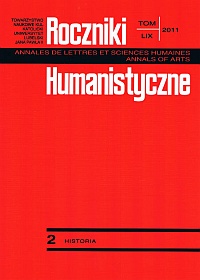Biskupi uniccy wobec reform kalendarza w drugiej połowie XVIII wieku
Abstrakt
The provisions of the Union of Brest guaranteed the use of the Julian calendar in the Uniate Church. In the second half of the 18th century, as result of the social-political changes and of the so-called reduction of holidays in the Latin Church the issue of a reform of the calendar was brought up in the circle of the Uniate Church hierarchs. Work on it and debates showed that the calendar was clearly considered to be a element identifying all the faithful and an important factor creating a sense of separateness and of one's identity in the multi-confessional and multinational Republic of Poland. The issue of a reform of the calendar used by the Uniate Church was raised in the forum of the Great Sejm, but a new list of holidays was compiled by Uniate bishops during the congress held in Warsaw on 17th September 1790. The hierarchy of the Uniate Church also had to take a position on the changes in the calendar introduced by the invader countries. The actions taken by Uniate hierarchs in the 18th century are an illustration of the attempt to unite and combine economic reasons with religious and social influences dictated by the ideas of the Enlightenment.
Bibliografia
Bieńkowski L.: Organizacja Kościoła wschodniego w Polsce, w: Kościół wPolsce, red. J. Kłoczowski, t. 2, Kraków 1968, s.781-1049.
Chotkowski W.: Kościół w Galicyi 1772-1780. Historyja polityczna Kościoła w Galicyi za rządów Maryi Teresy, t. 2, Kraków 1909.
Cubrzyńska - Leonarczyk M.: Warszawskie powiązania supraskiej drukarni oo. Bazylianów, w: Śladami unii brzeskiej, red. R.Dobrowolski, M.Zemło, Lublin−Supraśl 2010, s. 275-298.
Flynn J.T.: Irakliii Lisowski. Metropolita Uniate Chuch (1806-1809) and Reform In the Russian Empire, „The Slavonic and East European Review” 77(1999), s.93-116.
Frick D.A., Dzwony Wilna: mierzenie czasu w mieście wielu kalendarzy, w: Czas ikalendarz, red. Z. Kijas, Kraków 2001, s.237-270.
Kalinka W.: Sejm Czteroletni, t. 2, Warszawa 1990.
Knychalska A.: Kwestia unicka w czasie Sejmu Czteroletniego, w: Studia z dziejów XVII i XVIII wieku, red. K. Matwijowski, B. Rok, Wrocław 2003, s.163-169.
Kracik J.: „Nieposłuszne Kościołowi Dziatki”. Reakcja społeczna na papieskąredukcję świąt w Polsce w 1775 r., „Analecta Cracoviensia” 26 (1995), s.501-509.
Liedke M.: Recepcja kalendarza gregoriańskiego przez litewską jednotę ewangelicko-reformowaną w świetle akt synodalnych i korespondencji. Jeszcze jeden przyczynek do dziejów wprowadzania reformy gregoriańskiej w Rzeczypospolitej, w: Człowiek wobec miar i czasu w przeszłości, red. M. Liedke, P. Guzowski, Kraków 2007, s. 76-88.
Nabywaniec S.: Diecezja przemyska greckokatolicka 1772-1795, „Premislia Christiana”, t. 5 (1992/93), s.9-294.
Nabywaniec S.: Unicka archidiecezja kijowska w okresie rządów arcybiskupa metropolity Felicjana Filipa Wołodkowicza 1762-1778, Rzeszów 1998.
Nowakowski P.: Problematyka liturgiczna w międzywyznaniowej polemice po Unii Brzeskiej (1596-1720), Kraków 2004.
Осадчий Б.: Ілюзії чи відчай? Лист архиєпископа полоцького Іраклія Лісовського на тлі історії унії в Російській імперії на прикінці XVIII ст., „Rocznik Instytutu Europy Środkowo-Wschodniej” 5 (2007), s. 217-225.
Sakowicz E.: Kościół prawosławny w Polsce w epoce Sejmu Wielkiego, Warszawa 1935.
Copyright (c) 2011 Roczniki Humanistyczne

Utwór dostępny jest na licencji Creative Commons Uznanie autorstwa – Użycie niekomercyjne – Bez utworów zależnych 4.0 Międzynarodowe.





